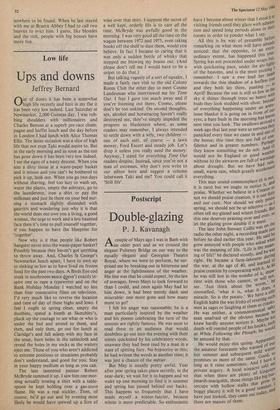Postscript
Double-glazing
P. J. Kavanagh
A couple of Mays ago I was in Bath with
an older poet and as we crossed the elegant Pulteney Bridge on our way to the equally elegant and Georgian Theatre Royal, where we were to perform, he sur- prised me by breaking out in bitterness and anger at the lightlessness of the weather. His line was that he could expect, by the law of averages, fewer Mays to look forward to than I could, and once again May had let him down, it had been merely dank and miserable: one more gone and how many more to go?
I felt his anger was reasonable; he is a man particularly inspired by the weather and his poems celebrating the turn of the seasons are rightly famous. He was soon to read these to an audience that would doubtless go out into the evening with their senses quickened by his celebratory words, unaware they had been read by a man in a state of spitting fury. No hypocrisy in this; he had written the words at another time; it was just a chance of the metier.
But May is usually pretty awful. Year after year spring takes place secretly, in the near-dark; we wait for it to happen and we wake up one morning to find it is summer and spring has passed behind our backs. This happens so frequently that I have made myself a winter-fancier, because winter is more predictable. So enthusiastic
have I become about winter that I extol it t° visiting friends until they glaze with admira- tion and spend long periods alone in their rooms in order to ponder what I say. All this is by way of preamble before remarking on what most will have already' noticed: that the opposite, to an extra- ordinary extent, has happened this year' Spring has not proceeded under wraps but, with quickening pace, under the arc-ligins, of the heavens, and is the most exciting ' remember. I saw a ewe lead her lamb towards the thin shadow of a leafless tree and they both lay there, panting April! Because the sun is still so low in ",,` sky it shines through trees so heavy via," buds they look studded with silver. Instead of everything happening under an arrilY. issue blanket it is going on in front of our eyes; a bare bush in the morning has leaves next time you look. The swallows arrived a week ago that last year were so nervous till panicked every time we came in and out ° the house; this time they are full of con. fjdence and in greater numbers. Perhaps, tj` they know something we do not. And would not be England or good weather_ without it) the airwaves are full of warning' about drought. But we have had rain' small, esvmearllihwinagrm. rain, which greatly accelerated This may sound commonplace (it is nod it is rare) but we ought to notice it, all r praise. Whether we believe in a Creator °, not we should praise creation, it is our duty and our cure. Nor should we only Praisci spring, we should not be so selective' often tell my glazed and winter friends. 13 uo' this one deserves praising over and over, s let the glazing grow double if it must. he The lateother tJoehr nnight, Stewart rd ecCool I iisn recording mad d ej he
was radio th
before he died earlier this year. He sa'hat grew annoyed with people who asked ‘v was the meaning of life. 'Life is the rnea'Ias ing of life!' he declared stoutly, and he w._.„ right. He became a farm-labourer during to sweacrr,eaatti otnh eb yagce000pfe r4a0t,i nagnwd learned At he was still lost in the wonder of it, inlpot, tient with those who cannot, or 1,01°,11 he see. 'Just think about the worm, miracle. So t'swthhaet piottaitso, :wwhat it slch English habit (he was Irish) of erehvearvien:suki: men as sages or laughing at them as salt., He was neither, a commonsensical s he man unafraid of the obvious because his knew hardly anyone notices it MaYbetich death will remind people of his books, silo as While Following the Plough; he w°
be amused by that.
He would enjoy this spring. APPar-etr the amateur forecaster who warned ot. u"'er hot summer and subsequent mild do so promises us more of the same. e 3 long as it rains sometimes. And Goov hav e private augury. A local wiseacre told ups that when there are plenty of king 'Ice big eaP,,._ buL
(marsh-marigolds, those things ,in
tercups with hollow stalks that gr°ver. boggy places) it will be a good surer" and there are m just looked, they them. out today, h"






































 Previous page
Previous page